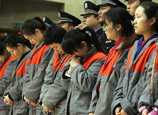
Apart from reshooting, Cao also said that the company will rescore the series, and the dialogue may be dubbed into English.
But Zheng Xiaolong, who directed the series, later said they've agreed that subtitles may be a better choice. Although English subtitles are in the DVD version, the US production team is still in the drafting phase of a better translation as well as a detailed editing plan. Both will then be submitted to Zheng for final approval.
Though both Zheng and Cao believe it's going to be the first serious instance of a Chinese TV drama exported to the US. Unlike any previously exported Chinese TV dramas that have ended up in Chinese channels, The Legend of Zhenhuan is believed to have a chance to be broadcast via mainstream TV stations.
Rumor has it that the show will be broadcast on HBO. However, the cable movie network has said that it is not currently involved with such projects.
Zheng confirmed that the show is not yet decided on a TV network. However, TV critics in the US are skeptical that the show will ever air on a major US TV network, particularly during prime time, its regular programming hours.
James Poniewozik, TV critic for Time magazine, said adaptations of foreign-language series such as Intriguement on HBO and Homeland on Showtime, both adaptations of Israeli series, have become more common in the US. But he doesn't see US TV taking foreign productions and running the original in subtitled form in prime time or during prominent programming.
"There is just a general feeling that has some substantiation in the commercial film market that the US audience is just not that receptive to reading subtitles," he said. "I don't know what would get lost in cultural translations. I think that inevitably, if you're adapting something from one culture and setting in another culture, you're going to lose some subtleties and cultural references."
Using Hamlet as an example, Poniewozik said that productions of William Shakespeare's classic play can be made in a Chinese dynasty rather than the original setting of Denmark, and still express similar themes. But despite the similarities, some elements would get lost in translation.
"Cultural translation is one factor, but the language is a bigger factor," he said.
 |
















 The journey is more important than the destination:Three people who opted for an adventure tell stories.
The journey is more important than the destination:Three people who opted for an adventure tell stories.


![]()
